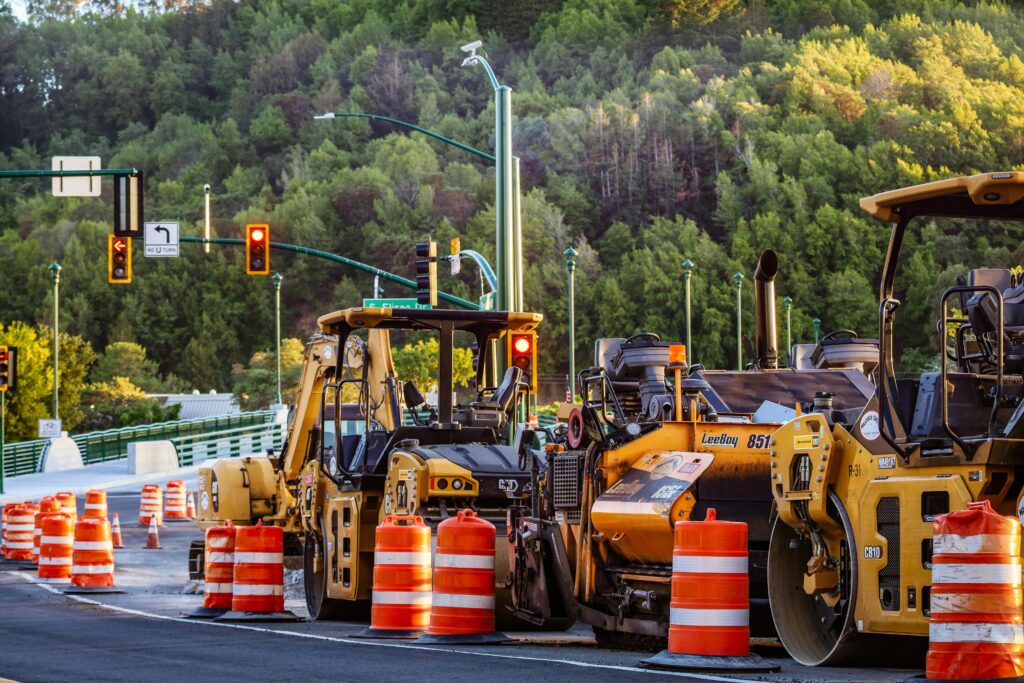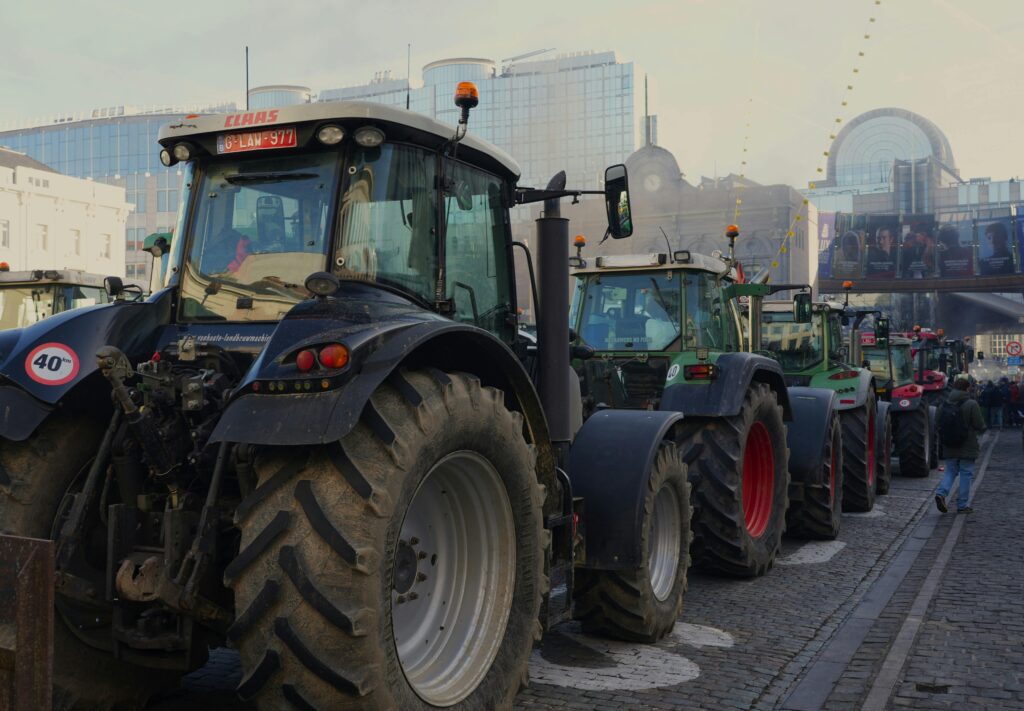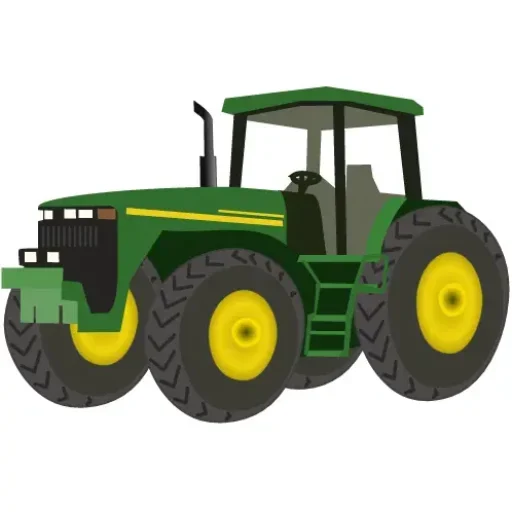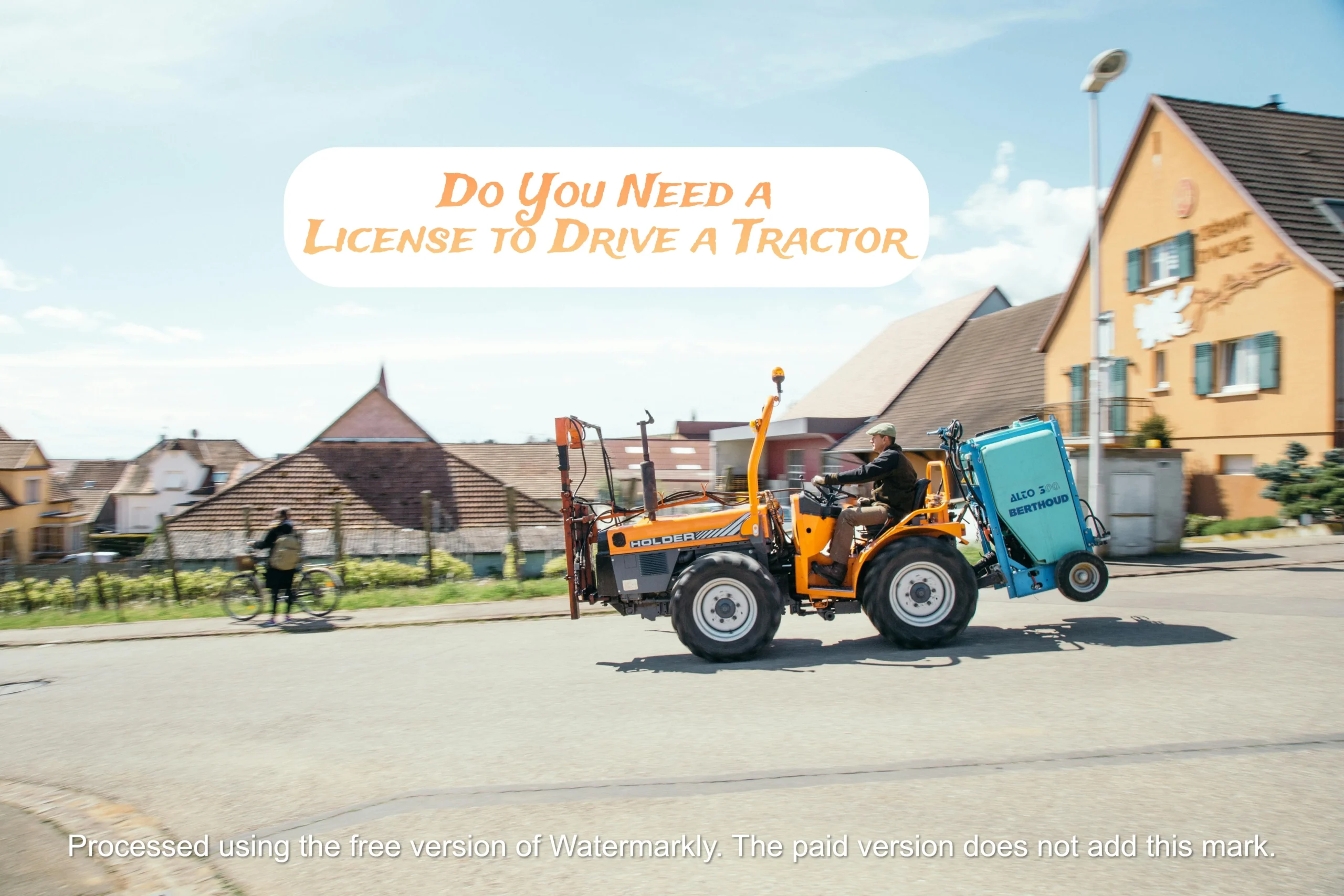In many regions, you do not need a standard driver’s license to operate a tractor, but specific requirements can vary. Typically, a special agricultural license or permit may be required, especially for younger operators or when driving on public roads. It’s important to check local regulations to ensure compliance.
Introduction
Tractors are integral to modern agriculture and construction, serving as powerful workhorses that can perform a wide variety of tasks. However, as with any large and potentially dangerous machinery, the question of licensing and regulation often arises. This comprehensive guide aims to address the complex and often location-specific question: Do you need a license to drive a tractor?
We’ll explore the various factors that influence tractor licensing requirements, including regional differences, the purpose of use, and safety considerations. Whether you’re a farmer, a construction worker, or simply curious about tractor operation, this article will provide you with valuable insights into the legal and practical aspects of tractor driving.
Understanding Tractor Operation
Before delving into licensing requirements, it’s essential to understand what exactly we mean by “tractor” and how these versatile machines are used in different contexts.
Types of Tractors
Tractors come in various shapes and sizes, each designed for specific purposes. Here’s a brief overview of the main types:
- Agricultural tractors: These are the most common type, used primarily for farming tasks.
- Industrial tractors: Designed for construction and earthmoving operations.
- Utility tractors: Smaller, multi-purpose tractors often used in landscaping and small-scale farming.
- Specialty tractors: Including orchard tractors, row crop tractors, and others designed for specific agricultural needs.
Common Uses of Tractors
Tractors serve a wide range of purposes across various industries:
- Plowing, tilling, and preparing fields for planting
- Planting and harvesting crops
- Hauling heavy loads and equipment
- Powering stationary machinery through a power take-off (PTO) shaft
- Mowing large areas of grass or brush
- Construction and earthmoving tasks
- Snow removal in winter months
Understanding these diverse applications helps contextualize the need for proper training and, in some cases, licensing for tractor operation.
Licensing Requirements for Tractor Operation
The requirements for operating a tractor can vary significantly depending on several factors, including geographical location, the specific use of the tractor, and whether it’s being operated on private property or public roads.
General Rules and Regulations
While there’s no universal “tractor license” that applies globally, many jurisdictions have regulations governing tractor operation. These rules often consider:
- The operator’s age
- The purpose of use (agricultural, industrial, or personal)
- Whether the tractor will be driven on public roads
- The size and power of the tractor
It’s crucial to note that even in areas where no specific license is required, operators are generally expected to be competent and knowledgeable about safe tractor operation.
Variations by Location
Licensing requirements can differ significantly from one country to another, and even between states or provinces within a country.
United States
In the U.S., tractor licensing laws are primarily determined at the state level. Generally:
- For agricultural use on private property, most states don’t require a special license.
- For operation on public roads, requirements vary. Some states allow farmers to drive tractors on roads without a special license, while others may require a regular driver’s license or a special agricultural license.
- Age restrictions often apply, with many states setting minimum ages for tractor operation (typically between 14-16 years old).

United Kingdom
The UK has more structured regulations:
- A standard car driving license (category B) allows operation of tractors on public roads.
- For larger agricultural vehicles, a category F license is required, which can be obtained at age 16.
- Specific training and a “certificate of competence” may be required for certain agricultural operations, especially for employees.
European Union
EU regulations provide a framework, but specific implementation can vary by country:
- Generally, a category B license is sufficient for smaller tractors.
- Larger agricultural vehicles may require a category T license.
- Age restrictions and training requirements vary by country.
Other Countries
Regulations in other parts of the world can range from very strict to virtually non-existent. It’s always best to check with local authorities for specific requirements.
Age Restrictions
Age restrictions for tractor operation are common, though they can vary:
| Region | Minimum Age for Private Land | Minimum Age for Public Roads |
|---|---|---|
| USA (typical) | 14-16 | 16-18 |
| UK | 13 | 16 |
| EU (typical) | 16 | 18 |
These age restrictions often come with caveats, such as supervision requirements or limitations on the size of the tractor that can be operated.
Special Cases and Exceptions
The licensing requirements for tractor operation often depend on how and where the tractor is being used.
Farm Use vs. Public Road Use
Generally, the rules are more relaxed for tractor operation on private farmland:
- Many jurisdictions don’t require any special license for operating a tractor on private property.
- However, once a tractor is driven on public roads, additional requirements often come into play.
- Some areas have specific exemptions for farmers moving equipment between fields, even if this involves short stretches of public road.
Commercial vs. Personal Use
The purpose of tractor operation can also affect licensing requirements:
- Commercial use, such as in construction or large-scale farming, may require additional certifications or licenses.
- Personal use, such as on a small hobby farm, often falls under less stringent regulations.
- Employers may have their own requirements for tractor operators, even if local laws don’t mandate specific licenses.
Safety Considerations
Regardless of legal requirements, safety should always be the top priority when operating tractors.
Importance of Proper Training
Even in areas where no license is required, proper training is crucial:
- Understanding the tractor’s controls and capabilities
- Learning safe operating procedures
- Recognizing potential hazards
- Knowing how to respond in emergency situations
Many agricultural organizations and equipment manufacturers offer training programs, which can be valuable even for experienced operators.
Common Tractor-Related Accidents
Awareness of common accidents can help operators stay safe:
- Rollovers: The leading cause of tractor-related fatalities
- Run-overs: Often occurring when passengers fall from the tractor
- PTO entanglements: Involving the tractor’s power take-off shaft
- Highway collisions: When tractors are driven on public roads
- Entrapment in moving parts: Such as in augers or balers attached to the tractor

Safety Equipment and Features
Modern tractors come equipped with various safety features:
- Rollover Protection Structures (ROPS)
- Seatbelts
- Safety shields for moving parts
- Improved lighting and visibility features
- Ergonomic designs to reduce operator fatigue
Operators should be familiar with these features and use them consistently.
Obtaining a Tractor License or Certification
In regions where licenses or certifications are required, the process typically involves several steps.
Training Programs
Many organizations offer tractor operation training:
- Agricultural extension services
- Farm safety organizations
- Equipment manufacturers
- Vocational schools and community colleges
These programs often cover:
- Basic tractor operation
- Safety procedures
- Maintenance and troubleshooting
- Relevant laws and regulations
Testing and Evaluation
Licensing or certification often involves both written and practical tests:
- Written tests may cover safety rules, traffic laws, and basic mechanical knowledge.
- Practical tests usually involve demonstrating safe operation of a tractor, often including tasks like hitching implements and operating on slopes.
Renewal and Continuing Education
Some jurisdictions require periodic renewal of tractor licenses or certifications:
- This may involve refresher courses or updated testing.
- Continuing education can help operators stay current with new technologies and safety practices.
Legal Implications of Unlicensed Tractor Operation
Operating a tractor without proper licensing (where required) can have serious legal consequences.
Liability Issues
Unlicensed operation can lead to:
- Increased personal liability in case of accidents
- Potential criminal charges for operating without a license
- Complications with insurance claims
Insurance Considerations
Insurance policies may have specific requirements regarding tractor operation:
- Operating without a required license could void insurance coverage.
- Some policies may require specific training or certifications, even if not legally mandated.
It’s crucial to review insurance policies carefully and ensure compliance with all requirements.
Future Trends in Tractor Licensing
As technology and regulations evolve, so too may the requirements for tractor operation.
Technological Advancements
Emerging technologies may influence future licensing requirements:
- Autonomous and semi-autonomous tractors may require new types of certifications.
- Increased use of GPS and precision farming technologies may necessitate additional training.
- Electric and alternative fuel tractors could introduce new safety considerations.

Changing Regulations
Regulatory trends to watch include:
- Increased focus on environmental considerations in tractor operation
- Potential standardization of licensing requirements across regions
- Greater emphasis on ongoing training and recertification
Operators and farm managers should stay informed about these trends to ensure continued compliance and safe operation.
Environmental Considerations in Tractor Operation
As environmental concerns become increasingly prominent, they’re beginning to influence tractor operation regulations and best practices.
Emissions Standards
Modern tractors are subject to increasingly stringent emissions standards:
- In the U.S., the Environmental Protection Agency (EPA) sets emissions standards for non-road diesel engines, including tractors.
- The European Union has similar regulations under its Non-Road Mobile Machinery (NRMM) directive.
- These standards often require advanced engine technologies and the use of cleaner fuels.
Sustainable Farming Practices
Tractor operation plays a crucial role in sustainable agriculture:
- Precision agriculture techniques, often involving GPS-guided tractors, can reduce fuel consumption and minimize soil compaction.
- Conservation tillage practices, which require specialized tractor attachments, help preserve soil health and reduce erosion.
- Some regions offer incentives or certifications for farmers who adopt environmentally friendly tractor operation practices.
Future Licensing Implications
As environmental regulations evolve, we may see changes in licensing requirements:
- Operators might need to demonstrate knowledge of emissions standards and environmental best practices.
- Specialized certifications could emerge for operators of electric or alternative fuel tractors.
- Training in precision agriculture techniques may become a standard part of tractor operation courses.

Tractor Operation in Different Industries
While agriculture is the most common context for tractor use, these versatile machines play important roles in various industries, each with its own set of considerations.
Construction Industry
Tractors in construction often face different challenges:
- They frequently operate in urban environments, increasing the importance of road safety knowledge.
- Operators may need additional certifications for specific attachments like backhoes or excavators.
- OSHA regulations in the U.S. set specific safety standards for tractor operation in construction settings.
Landscaping and Groundskeeping
Smaller utility tractors are common in this industry:
- Operators often work in public spaces, emphasizing the need for safety awareness.
- Specialized attachments for mowing, grading, and snow removal may require additional training.
- Licensing requirements can vary depending on whether the work is done on private property or public land.
Forestry
Tractors used in forestry face unique challenges:
- Operators often work on steep, uneven terrain, requiring advanced skills.
- Specialized forestry attachments like winches and log skidders may necessitate additional training.
- In many regions, forestry tractor operators need industry-specific certifications.
International Perspectives on Tractor Licensing
As global trade in agricultural products increases, understanding international tractor licensing norms becomes more important.
Developing Countries
Many developing nations are in the process of establishing or updating tractor regulations:
- In India, efforts are underway to standardize tractor operation training and licensing across states.
- Several African countries are introducing tractor operator training programs to support agricultural mechanization efforts.
Australia and New Zealand
These countries have well-developed agricultural sectors with specific tractor regulations:
- In Australia, tractor operation on farms generally doesn’t require a license, but operation on public roads does.
- New Zealand requires a special license (Class 1 and 6) for operating tractors on public roads, with different rules for agricultural and non-agricultural use.
Japan
Japan has a unique system for tractor operation:
- A special “agricultural machine license” is required for operating tractors and other farm machinery.
- This license can be obtained at age 16, earlier than the standard driver’s license age of 18.
Tractor Safety Technologies and Their Impact on Licensing
Advancements in tractor technology are changing the landscape of tractor operation and safety.
Autonomous and Semi-Autonomous Systems
Self-driving tractors are becoming increasingly common:
- These systems may require operators to have additional technical knowledge.
- Future licensing requirements might include demonstrating proficiency in managing autonomous systems.
- Questions of liability and insurance for autonomous tractor operation are still being debated.
Advanced Safety Systems
Modern tractors often include sophisticated safety features:
- Stability control systems to prevent rollovers
- Object detection and collision avoidance systems
- Ergonomic designs to reduce operator fatigue
As these technologies become standard, training and licensing programs may need to evolve to ensure operators can effectively use these features.
The Role of Virtual Reality in Tractor Operation Training
Virtual reality (VR) is emerging as a powerful tool for tractor operator training:
- VR simulations can provide safe, realistic training scenarios for novice operators.
- Complex or dangerous situations can be practiced without risk.
- Some training programs are beginning to incorporate VR elements, which could become part of future licensing requirements.
Economic Implications of Tractor Licensing
The regulatory environment around tractor operation can have significant economic impacts:
Costs of Compliance
Obtaining and maintaining proper licensing can involve various costs:
- Fees for training courses and licensing exams
- Potential lost work time during training and certification processes
- Costs of upgrading equipment to meet current standards
Insurance Considerations
Proper licensing often affects insurance rates and coverage:
- Unlicensed operation may void insurance policies.
- Some insurers offer discounts for operators with advanced certifications.
- As autonomous technologies become more common, insurance models may shift to focus more on the equipment itself rather than the operator.
Impact on Labor Markets
Licensing requirements can influence agricultural and construction labor markets:
- Stricter requirements may lead to a shortage of qualified operators in some areas.
- However, they may also result in higher wages for properly licensed operators.
- In some regions, tractor operation is becoming a more specialized, skilled profession due to technological advancements and regulatory requirements.
Tractor Licensing and Road Safety
As tractors frequently need to travel on public roads, their interaction with other vehicles is a critical safety concern.
Visibility and Speed Differentials
Tractors on public roads present unique challenges:
- Their slow speed can surprise other drivers, necessitating proper signage and lighting.
- Large implements attached to tractors can affect visibility and maneuverability.
- Some regions require special permits or time restrictions for moving oversized agricultural equipment on roads.
Specific Road Rules for Tractors
Many areas have specific traffic laws for tractors:
- Designated tractor lanes or crossings in agricultural areas
- Restrictions on times of day when tractors can use certain roads
- Requirements for escort vehicles for oversized loads
Understanding and following these rules is often a key part of tractor operator training and licensing.
The Future of Tractor Operation and Licensing
As we look to the future, several trends are likely to shape tractor operation and related licensing requirements:
Integration with Smart Farming Systems
Tractors are becoming part of larger, integrated farming systems:
- Operators may need to understand data management and analysis.
- Licensing could include demonstrating proficiency in using farm management software.
- Cybersecurity awareness may become part of tractor operation training as equipment becomes more connected.
Emphasis on Sustainable Practices
Environmental concerns are likely to play a larger role:
- Licensing may include modules on reducing environmental impact.
- Operators might need to demonstrate knowledge of soil conservation techniques.
- Certification in carbon-efficient farming practices could become valuable.
Globalization of Standards
There may be a move towards more standardized international requirements:
- This could facilitate the movement of agricultural workers across borders.
- International organizations might play a larger role in setting global best practices for tractor operation.
Conclusion
The question “Do you need a license to drive a tractor?” doesn’t have a simple, universal answer. Requirements vary based on location, the type of tractor, its intended use, and whether it will be operated on public roads. While many jurisdictions don’t require specific licenses for operating tractors on private farmland, regulations become more stringent when tractors are used on public roads or for commercial purposes.
Regardless of legal requirements, the importance of proper training and safety awareness cannot be overstated. Tractors are powerful machines that can be dangerous if operated improperly. All operators should seek appropriate training and stay informed about best practices for safe tractor operation.
As regulations and technologies continue to evolve, it’s crucial for tractor operators to stay informed about current requirements in their area. By prioritizing safety, seeking proper training, and complying with all relevant regulations, tractor operators can help ensure the continued safe and effective use of these essential machines in agriculture, construction, and beyond.
FAQs
- Q: Can I drive a tractor on public roads without a license?
A: This depends on your location and the purpose of use. In many areas, you need at least a standard driver’s license to operate a tractor on public roads. Some regions have specific agricultural vehicle licenses. Always check local regulations. - Q: At what age can I start driving a tractor?
A: Age restrictions vary by location and whether the tractor is being used on private land or public roads. In the U.S., many states allow teens as young as 14 to operate tractors on farms, but require operators to be 16 or older for public road use. Always verify age requirements in your specific area. - Q: Do I need a special license to drive a tractor for commercial purposes?
A: Commercial use often involves stricter regulations. While not always required, many employers mandate specific certifications or licenses for commercial tractor operation. This can include special commercial driver’s licenses or industry-specific certifications. - Q: Is training required to operate a tractor even if no license is needed?
A: While not always legally required, proper training is crucial for safe tractor operation. Many agricultural organizations and equipment manufacturers offer training programs. Some insurance policies may also require proof of training. - Q: How do licensing requirements differ for large agricultural vehicles compared to standard tractors?
A: Larger agricultural vehicles, such as combine harvesters or large capacity trailers, often have more stringent licensing requirements. In many areas, these may require special categories of licenses, additional testing, or higher age restrictions compared to standard tractors.

